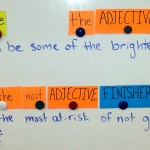Should Arizona high school graduates understand civics? Heck, yes. What? I agree with our Republican-dominated legislative and executive branch on an issue?
As in many other states, our state legislature and national representatives are elected disproportianately by older, wealthy white people. And I can’t be certain, but I would guess that generally, it is the same group who for the most part supports political campaigns that get candidates onto the ballot. Now, I personally have nothing against older, wealthy white people in particular. After all, my own grandparents were somewhat fortunate older white people, my mother is an older white person, and if I am lucky I will someday be an older, financially-stable white voter.
 The problem is that a small group of disproportionately OWW people is making decisions which affect the economic well-being, civil rights and education of people who are not necessarily older, white, financially successful, or in fact educated. This is a huge problem for democracy nationally and in Arizona. Ideally all stakeholders should be learning about the issues and using their voices and votes.
The problem is that a small group of disproportionately OWW people is making decisions which affect the economic well-being, civil rights and education of people who are not necessarily older, white, financially successful, or in fact educated. This is a huge problem for democracy nationally and in Arizona. Ideally all stakeholders should be learning about the issues and using their voices and votes.
Of course, if you are living in poverty, you have little time to pay attention to the ballot issues.
Despite some flawed research that our Governor cited in his first State of the State address, it is clear from many studies that most Americans, especially young people, have a lot to learn about American geography, history and government, not to mention their rights and the importance of civic engagement. People have been saying this for a long time. Education may go a long way to encouraging voting even among the poor. At least, that is my hope.
People will not vote unless they feel that they know the issues and that their votes matter. And yes, that amounts to a better understanding of civics.
So far, I have been ignoring the issue of the new requirement that Arizona high school graduates pass the same citizenship test as naturalized citizens. I want to support this test. Even if I believe that it is not intended to actually help poor and minority students become more enfranchised, even if I believe that the civics test requirement is a move intended to appease right-wing interests, I still want to support it. Because the idea of democracy is in danger in this country, and it wouldn’t hurt a single one of us to better understand the processes by which we are governed.
However, if civic engagement is truly the goal, this test is not the answer. It burdens the schools with yet another resource-sucking administrative process without addressing school funding droughts and inequities across the board, or helping to develop strategies that would actually engage students in authentic civics learning. Time spent on civics education has declined, and will continue to decline under Common Core State Standards (which only address reading, writing and math) and No Child Left Behind, which also focuses on basic language arts and math skills. Building in more authentic civics learning hours will be a huge challenge without additional educational funding in Arizona, which is not forthcoming.
There is a bizarre and growing disconnect in this country between what we know about authentic assessment and its potential to help students understand such a multifaceted and rich topic as civics and this weird drive to test everything using objective tests, which is what the citizenship test is. I highly doubt that any civics test will really delve into such compelling topics as
- How much campaign money comes from out-of-state political groups who hide the identity of large donors?
- How can communities create grassroots changes that make their way into local and state laws and policies?
- How have our recent ideas of liberal and conservative been shaped, and how accurate are they to the way that people really think and vote?
- How much of our education funding ends up lining the pockets of testing and textbook companies, or large charter school corporations who are not based in our state?
- How much tax liability do Arizona corporations really have, and is it indeed their responsibility to help shoulder the burden of education and human services in this state?
- How is the requirement that English Language Learners spend four hours a day learning English affecting their achievement in other academic areas in which they may excel, and what is this costing our state in terms of lost revenue when these students are delayed in their educational progress?
- Are we doing enough with our laws to protect the environment and encourage responsible consumer choices?
It’s true the new test shouldn’t cost much to develop. It already exists. But we are talking about a state who has refused even to fund inflation increases for education for years on end. The idea of tossing in one more major requirement for schools between eighth grade and graduation seems disingenuous if the premise is that students need to learn more about being good citizens. There are better ways to accomplish that. But they cost money.









Comments 2
Hey Amethyst, nice post. I don’t have anything in principle against expecting citizens to know what we expect immigrants to know about our Civics. (But we need another test like we need another boy band). I’ve got some areas to push back, though, and some other comments. First, you say, “Now, I personally have nothing against older, wealthy, white people in particular.” But do you in general? If so, why? Second, you have a couple of “even if I believe”s. Do you mean, “even though I believe” or are you are you really speaking hypothetically? I’m curious what you do believe the motives behind the bill are. Third, and this really isn’t pushing back, but can’t not voting or being otherwise engaged as you understand it, also be a form of engagement? I don’t think it’s particularly cynical to withdraw from political activity (even voting) if the difference in the behavior of the parties is negligible to one. (I think it’s a valid form or engagement. I also think non-voters can certainly complain – an opinion that runs against a common cliche.) Lastly, your questions near the end are super – but should be given to policy-makers. They remind me of the kind George Will often writes before a debate or during a convention. For our students, I’d go much more general. For example, a vocabulary test based on the pledge or the preamble to the Constitution or Declaration of Independence.
Hi, Amethyst! I really enjoyed this post and your thoughts. As a preschool teacher, I am far away from this issue. I have wondered how upper grades teachers are feeling. In general, I don’t support any more testing of our students–unless they are traded for some other tests already in place. High stakes testing has very negative effects on students and school culture. However, you provided some interesting ideas that opened my mind about why this test could be a benefit. Thanks for increasing my balanced thinking about the topic!